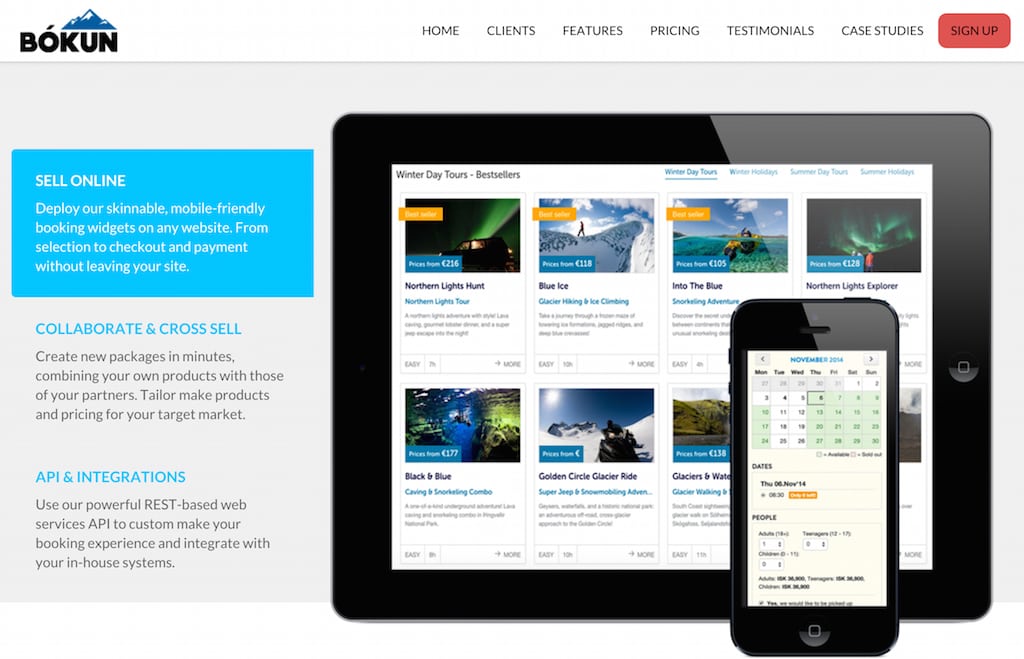Icelandic Travel Companies Are Rallying Around a Homegrown Sales Platform

Skift Take
Smaller, independent hotel and travel companies typically don’t have large marketing budgets, adequate websites, or any leverage with the online travel booking engines, so it’s always a challenge to grow market share.
Also, many well-funded aggregator companies designed to support individual tour operators and sell their activities to a broader consumer base have traditionally not proven to engage buyers at scale.
Launched in Iceland in 2012, however, Bokun is a cloud-based sales and inventory management platform that seems to be bucking that trend. Independent travel and tourism companies can join Bokun to distribute their products, track inventory and sales, and repackage and resell products from other member suppliers.
The company won the Iceland Startup of the Year award at the Nordic Startup Awards 2015.
According to Bokun CEO Hjalti Baldursson, the platform is a sales channel for over 80% of the tour operators and transportation companies on the island, and many of the hotels as well. Members include Avis, Budget, Grayline and Reykjavík Excursions, with individual user license pricing locked at a flat $100 per month fee.
Once companies sign up with Bokun, they simply embed the proprietary sales widget into their website and connect it with an international payment provider. Presently there are around 350 companies using the system today, which Baldursson anticipates will double in Q1 2016.
“Another one of the reasons for Bokun being so popular is that it’s not just a sales and inventory system,” explains Baldursson. “It is also the day-to-day operational system for those companies, so they have activity dashboards with all of their pick-up lists and passenger reports, etc., and everything is in real time.”
Bokun is also integrated with external sales channels such as TripAdvisor’s Viator platform. Meaning, when companies sell product on Viator, the change in inventory is automatically updated in the Bokun system.
The company does not take a commission on each sale. The long term business model prioritizes a high adoption rate throughout the country, because Baldursson’s goal is eventually to start scaling Bokun into countries across the continent.
Competitor Cross-selling Agreements
The second primary value proposition for partner companies to join Bokun, according to Baldursson, is the ability to source and resell other members’ products. Or, companies can combine their travel packages with other suppliers to create new combo travel packages.
A fishing outfitter for example who operates in the mornings could sell a full day package by partnering with a canoe company offering rides in the afternoon.
If members see a product they’re interested in reselling or repackaging, they submit a contract proposal through the Bokun backend to that party. The recipient can then accept, make a counter proposal, or decline.
To date, over 3,600 contracts have been signed, and another approximately 1,300 contracts are pending.
“Bokun keeps track of all account receivables, but payments don’t go through Bokun,” says Baldursson. “Bokun just provides all of the reporting concerning commissions between companies, and everything is automatic. This has become very popular because there are no allotments, and everything is done with real-time inventory.”
He adds that when companies are all using the same platform, they can constantly be increasing their product offerings and exposure.
“We have more or less changed the course of tourism in Iceland, and we hope to change the course of tourism in other regions as well,” Baldursson says. “The traditional buyer/seller relationship is changing a bit because 45% of our suppliers have active reseller agreements with other suppliers who are often competitors, which shows the dynamic of where the market is going now.”




